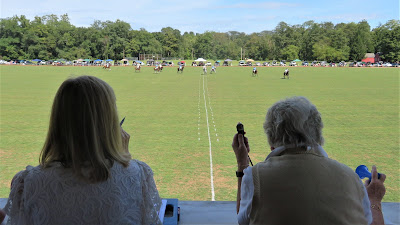What struck me about the story is how the EuroAmerican farmers, encouraged by the government and supported by a good economy, tore up the native grasses, grew wheat and other grains and made lots of money in the process. But then came the Depression, and crop prices went down.
To cover their debts and still make a profit, farmers plowed up yet more grasslands and planted more crops. Then a dry period arrived. The native grasses could survive the dry periods, but the grains could not. The crops withered and died. The dry dirt blew away in the wind. The farmers grew increasingly desperate. Many of them were foreclosed; many of them left. Some of those who stayed behind died of lung diseases or starvation.
 In other words, maybe through no fault of their own, but through their ignorance of the climate, their lack of foresight, their eagerness to make more money -- and urged on by the government -- they brought this crisis on themselves.
In other words, maybe through no fault of their own, but through their ignorance of the climate, their lack of foresight, their eagerness to make more money -- and urged on by the government -- they brought this crisis on themselves.Sound familiar?
Most of us care about the environment, whether we believe global warming is an immediate threat -- like Al Gore or this young climate activist from Sweden Greta Thunberg -- or simply regard it as a long-term concern. Or even if you think global warming is a hoax, you still probably want to breathe clean air, and don't want to be sucking exhaust out of the tailpipe of a ten-year-old pickup truck or live within spitting distance of a coal-fired electric plant.
Of course we all want the government and the big corporations to do something about it. But what is our responsibility?
Do we blame the oil companies for digging up the oil? Or do we blame the auto companies for producing gas-guzzling SUVs, or ourselves for buying and driving those gas-guzzling SUVs? (Trucks and SUVs now account for roughly 65% of new vehicle sales, and according to the EPA, the Jeep Wrangler averages 18 mpg, the Mercedes standard SUV gets 16 mpg and the Dodge RAM pickup limps in at 14 mpg.)
Still, we have to live in our world, and we need to get around. And there are plenty of good reasons why we retirees like to drive father than to the corner store. We like to travel. We travel to meet up with family and to bring our friends closer together. We travel to broaden our horizons, to see how other people live, appreciate other cultures and better understand our world.
And then there's the kind of travel that B calls "expensive entertainment." That's when you go to Disneyworld or a resort in the Caribbean or pretty much anything you do in Las Vegas.
But when we travel there is a cost to the environment. That four-hour drive down the interstate in your SUV, at 70 mph, burns up about 12 gallons of gasoline, spewing those hydrocarbons into the air. The coast-to-coast airline flight burns about 15,000 gallons of fuel (or roughly 40 gallons per passenger). When you consider that every day there are about 100,000 commercial flights in our skies, plus another 30,000 non-commercial flights -- that's a lot of hydrocarbons!
So what do we do? Just continue to blame big government and big business? Or can we modify our behavior enough to make a difference?
Personally, I try to stay off airplanes anyway, because I don't like to fly. But maybe we should be more intentional about hopping on a plane just because the airline is advertising a cheap rate to some entertaining destination.
Maybe we should try to go by train, if possible. (Kudos to the 200 - 300 retirees, per day, who make their trip to Florida on the Autotrain.) Or perhaps we can carpool.
My golf group of mostly retired teachers travels around to different golf courses, often bypassing perfectly good courses to travel 30 miles to a place with slightly cheaper rates. But the guys do make an effort to carpool. Sometimes it's a pain in the neck, turning a 30-minute drive into a 45-minute drive by the time you go out of your way to get to a meeting point, then wait for other people to arrive, and then all pile in and get going again. Does it make any difference?
But as far as our own travel goes, maybe we can focus our trips closer to home. How many New Yorkers jet off to France to see the Eiffel tower, but never bother to take the ferry out to the Statue of Liberty? There often are plenty of interesting places close to home that are just as enriching, just as entertaining as the place a thousand miles away.
I remember when I was a kid, my mother urged us to batch our car trips. Why make three car trips when you can get everything done in one trip, and save a little on gas, she'd challenge us. And this was before the energy crisis, when gas cost 35 cents a gallon!
I don't have all the answers. Honestly, as far as global warming goes, I think if anything saves us from ourselves, it will be technology. But it can't be electric cars. Where do you think we get the electricity to power electric cars? From burning coal and oil and natural gas.
But I'm guessing they'll come up with some new form of energy that will be cleaner than petroleum and more powerful than wind or solar (but that will probably pose some other problem to challenge our grandchildren). In the meantime, maybe we should help out, at least where we can . . . before everything turns to dust and blows away in the wind.


















